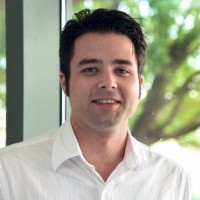Shifting the Conversation - A New Era of Nuclear Dialogue
Starting a nuclear career as a nontraditional student can be daunting. I entered the academic world in 2009 as a 25-year-old with eight years of culinary arts under my belt. I am not your typical nuclear engineering student; I was not a model student and hadn't studied any higher-level math or physics courses in high school. I was a professional cook and chef instructor working with my hands and exploring the world of food for years before making a shift to nuclear.
I decided to study nuclear engineering when they were finishing construction of the Large Hadron Collider. I was working in a kitchen, and I heard that it was going to make a black hole and destroy the world. So my restaurant buddies and I had an end-of-the-world party and I thought - people work there, people do this for a living. Entering academia was a big move for me; the first two years were rocky, honestly. I had very little going for me aside from a dream, positive mental attitude and some decent work ethic instilled from years of working in hot kitchens. I kept with it and received my bachelor's degree in nuclear science and engineering from Oregon State University in 2013, and continued on to achieve my master's degree in nuclear science and engineering in 2015 upon returning from a summer spent working as an intern at Idaho National Laboratory. I have elected to remain at Oregon State for my doctorate.
I value academic achievement as I value family and world community. I joined the nuclear science field with the hope of effecting change in the way energy is produced the world over. I choose to believe that with enough perseverance on behalf of all involved parties, a reasonable solution may be materialized which provides carbon-free baseload power and frees humanity from the chains of energy production through the combustion of fossil fuels. The solution isn't 100 percent nuclear, and it isn't 100 percent renewable. The logic entails a mixture of all power sources.
While I'm interested in discussing a great deal of topics, I've been thinking about our approach in communicating with the so-called "outsiders" of our world who are not scientists, who are not engineers, who are not as technically involved as our community. Put simply, I am referring to the laymen and laywomen that so many of us are quick to dismiss as ignorant, as careless, as foolish. Years ago, I would refer to myself as a layman, and in many ways I still am. One thing I've realized in my academic career to date is that every time I learn something, I also learn just how little I am aware of the boundless knowledge surrounding us.
As a community of responsible scientists and engineers, we can no longer minimize the approach we take in dealing with members of the public. I feel like we've known this all along but our community has lacked the drive to rise above the gut response of "go away, I'm busy, and you're ignorant." I have had the fortune of attending various conferences and getting to know my peers in the nuclear community, and it is rare that I have been a part of a conversation regarding nuclear power and public perception which did not quickly devolve into a discourse on how "they're all idiots."
We're brilliant in our inventions, our optimizations, our logic, our drive and our heart to make things better.
I believe that most of us want the best for the planet, and we want to make life good for ourselves and others. So why is it that we so often slight those who are less-informed? There are many answers to this question, but a sweeping generalization might be: the public doesn't know about what we do, they don't take the time to learn, so why would we bother to educate if all they're going to do in the end is try to shut down power plants and suppress the good work we do? I believe persistence is the key, as is the tone of our response.
We tend to go on the offensive, fighting fire with fire. What about a more gentle approach? What if we tried this: the next time I am verbally attacked by an anti-nuclear party, instead of just answering them with facts about how nuclear is so safe, turn the tables and ask them, "What's up? Why do you think that way?" Try to reach out and be curious (one of the marks of a scientist), try to understand where this person is coming from instead of dismissing them as a knucklehead.
We can do it. It will take a shift in our perception of others, it will take patience. But surely we have this -spending weeks, months and years in the pursuit of a single result has indoctrinated patience into us. It is our time now to redistribute an adversarial tone for one of temperance and compassion. Perhaps it's a little cliché (and a quote not directly attributed to Einstein), but insanity is repeating the same experiment over and over and expecting different results. Most of the response of the nuclear community has been the same for decades. We've entered a new era here, and instead of merely breaking the cycle, let's redesign the entire thing.
 Jackson Harter recently finished an internship with the Fuel Modeling & Simulation Department in the Nuclear Science and Technology Directorate at Idaho National Laboratory and is currently working on his doctorate in nuclear science and engineering at Oregon State.
Jackson Harter recently finished an internship with the Fuel Modeling & Simulation Department in the Nuclear Science and Technology Directorate at Idaho National Laboratory and is currently working on his doctorate in nuclear science and engineering at Oregon State.

